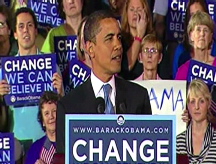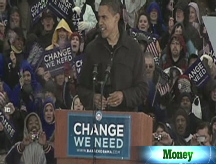Dollar mixed as economy weighs on investors
Markets anticipate aggressive action by European Central Bank and Bank of England but grim economic data limits gains.
NEW YORK (CNNMoney.com) -- The U.S. dollar was mixed against other currencies Wednesday as investors weighed potential interest rate cuts against more signs of economic weakness.
The euro rose 0.15% to $1.3003 from $1.2999 late Tuesday in New York. On Tuesday, the 15-nation currency surged more than 3% to a high of $1.3027 for the day.
Britain's pound traded at $1.5949, down slightly from $1.5961. Earlier, the pound rose nearly 1.5% to a session high of $1.6198.
Against the yen, the dollar traded at ¥98.89, down from ¥99.78.
"The global growth outlook is the driving factor for investors," Sylvester said Gareth Sylvester, senior currency analyst at foreign exchange brokerage HiFX in San Francisco.
To that end, currency traders have been using world stock markets to gauge the severity of what many economists say is a looming global recession.
U.S. stocks fell Wednesday as negative economic reports appeared to outweigh a resolution to the country's presidential election, which had been a source of uncertainty.
European shares were pushed lower by weak corporate results while Asian markets rallied.
But expectations for larger-than-expected interest rate cuts by the European Central Bank and the Bank of England Thursday bolstered the euro and the pound.
The market is expecting the BOE to cut its benchmark interest rate 50 basis points to 4% when it meets Thursday. Many investors think policymakers could cut a full percentage point given the weak U.K. economy, Sylvester said.
Meanwhile, the ECB is also expected to cut its benchmark rate by 50 basis points to 3.75%.
"Proactive monetary policy is a positive" for the currency market, Sylvester said.
Economy and politics. U.S. markets were pressured Wednesday by a slew of negative economic reports that came one day after the nation made Democrat Barack Obama its president-elect.
The Dow Jones industrial average was down nearly 4% with about two hours left in the session.
"Markets are quickly refocusing on the sobering economic data," said Ashraf Liadi, chief currency strategist at CMC Markets in New York.
Outplacement firm Challenger, Gray & Christmas Inc, said job cut announcements by U.S. employers soared to 112,884 in October, up 19% from September's 95,094 cuts.
Separately, payroll manager ADP said private sector employers cut a seasonally adjusted 157,000 jobs last month, more than six times September's decrease.
The two reports paint a grim picture for the labor market as investors prepare for the Department of Labor's monthly unemployment report on Friday. That report is expected to show that 200,000 jobs were lost in October and that the unemployment rate grew to 6.3% from 6.1% a month earlier.
Another report showed that the nation's service sector shrank in October. The Institute for Supply Management's (ISM) non-manufacturing index fell to 44.4 from 50.2 in September, marking the lowest reading in the retooled report's 10-month history.
The market's focus on economic weakness and the dollar's decline took a toll on the price of gold.
Gold for December delivery fell $15.80, or more than 2%, to $741.50 per troy ounce on the New York Mercantile Exchange.
Many investors buy dollar-denominated commodities like gold and oil when the U.S. currency weakens to hedge other investments and sell those assets when it regains ground.
On Tuesday, the December contract for gold rose $30.50 to settle at $757.30 an ounce as the dollar fell sharply against the euro.
Wednesday's round of gloomy economic reports also overshadowed any relief the market may have felt at the end of a protracted presidential campaign.
Obama's defeat of Republican Sen. John McCain was largely expected by investors. But the Democrat's victory, along with the party's gains in Congress, could mean significant changes in fiscal and monetary policy.
Kevin Chau, foreign currency analyst at IDEAGlobal in New York, said he expects trading to be volatile as investors respond to the changing political landscape.
"We have to wait to hear what Obama has to say in terms of fixing the economy," Chau said.
Despite the prospect of more dour economic data, weak corporate results and gloomy outlooks from corporate CEOs, the market could get a boost Wednesday if new details of Obama's economic policy emerge, according to Liadi.
"Markets may see further temporary gains in the near term by what is likely to be a high profile appointment to the Treasury and council of economic advisors," he said.
Among those reportedly being considered for the job of Treasury Secretary: New York Federal Reserve President Timothy Geithner, Berkshire Hathaway's Warren Buffett, Federal Deposit Insurance Corp. Chairman Sheila Bair and New Jersey Governor Jon Corzine.
Did you vote for Obama? How do you think the new president will affect your wallet? What do you think Obama needs to do to fix the economy - both in the short run and the long term? What should be first on the new Congress's agenda? E-mail us your thoughts, including your name, photo and contact info; the best answers will be featured in an upcoming CNNMoney.com article. ![]()




